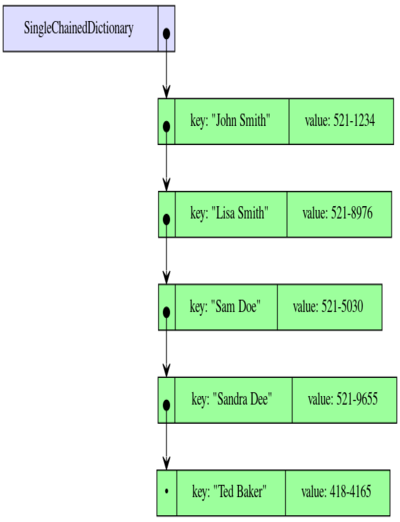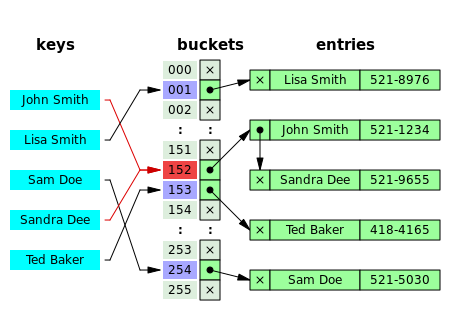Difference between revisions of "Sorted Dictionary Assignment"
| Line 1: | Line 1: | ||
| + | =Background= | ||
{{:Dictionary_Assignment}} | {{:Dictionary_Assignment}} | ||
=Code To Use= | =Code To Use= | ||
Revision as of 05:32, 1 November 2020
Contents
- 1 Background
- 2 Motivation
- 3 Reference
- 4 Code To Investigate
- 5 Code To Implement
- 6 Testing
- 7 Pledge, Acknowledgments, Citations
- 8 Code To Use
- 9 Code To Implement
- 10 Testing
- 11 Pledge, Acknowledgments, Citations
Background
Motivation
In this and the follow up Sorted Dictionary studio, you will build three implementations of a dictionary. Each will be an immutable data structure.
Reference
SML structure Option
datatype 'a option = NONE | SOME of 'a
Code To Investigate
signature Dictionary
Note the include in the DICTIONARY signature.
signature DICTIONARY_FUNCTOR_PARAMETER = sig
type (''k,'v) dictionary
type ''k create_parameter_type
val create : ''k create_parameter_type -> (''k,'v) dictionary
val get : ((''k,'v) dictionary *''k) -> 'v option
val put : ((''k,'v) dictionary *''k *'v) -> (''k,'v) dictionary * 'v option
val remove : ((''k,'v) dictionary *''k) -> (''k,'v) dictionary * 'v option
val entries : (''k,'v) dictionary -> (''k*'v) list
end
signature DICTIONARY = sig include DICTIONARY_FUNCTOR_PARAMETER
val keys : (''k,'v) dictionary -> ''k list
val values : (''k,'v) dictionary -> 'v list
end
create
Specific to each structure. Creates an empty immutable Dictionary.
get
Behaves much like java.util.Map<K,V>'s get(key) method except instead of returning null or the associated value, it returns an option.
put
Behaves much like java.util.Map<K,V>'s put(key,value) method except
- instead of mutating the provided dictionary, it returns an immutable updated dictionary.
- instead of returning null or the previously associated value, it returns an option of the previously associated value (along with the updated dictionary in a 2-tuple).
remove
Behaves much like java.util.Map<K,V>'s remove(key) method except instead of returning null or the previously associated value, it returns an option.
- instead of mutating the provided dictionary, it returns an immutable updated dictionary.
- instead of returning null or the previously associated value, it returns an option of the previously associated value (along with the updated dictionary in a 2-tuple).
entries
Behaves much like java.util.Map<K,V>'s entrySet() method.
keys
Behaves much like java.util.Map<K,V>'s keySet() method.
values
Behaves much like java.util.Map<K,V>'s values() method.
Code To Implement
functor DictionaryFn
Each implementation of dictionary can reuse the same functions which given a list of entries produce the keys and values. functor DictionaryFn accepts a signature parameter which defines all of the necessary functions besides keys and values. Critically, this includes the entries function which can be employed to support the keys and values functions.
keys
One of List's higher order functions can be useful here. Which one is it?
fun keys(dict : (''k,'v) dictionary) : ''k list =
raise Fail "NotYetImplemented"
values
One of List's higher-order functions can be useful here. Which one is it?
fun values(dict : (''k,'v) dictionary) : 'v list =
raise Fail "NotYetImplemented"
structure Chain
Both the SingleChainedDictionary and the HashedDictionary will leverage chaining to deal with collisions. A collision is where more than one (key, value) entry wants to be store in the same chain (a.k.a. list of (key, value) entries). For the SingleChainedDictionary, every unique key will "collide" with every other one since all of them will be stored in the single chain of the SingleChainedDictionary. For the HashedDictionary, there should be fewer collisions since there will be a multiple chains to spread the load, but handling collisions should be similar to the SingleChainedDictionary once the appropriate chain is determined.
We implement structure Chain so we can use the code in both SingleChainedDictionary and HashedDictionary.
signature CHAIN = sig
val get : (''k*'v) list * ''k -> 'v option
val put : (''k*'v) list * ''k * 'v -> ((''k*'v) list * 'v option)
val remove : (''k*'v) list * ''k -> ((''k*'v) list * 'v option)
end
get
fun get(chain : (''k*'v) list, key:''k) : 'v option =
raise Fail "NotYetImplemented"
put
fun put(chain : (''k*'v) list, key:''k, value:'v) : (''k*'v) list * 'v option =
raise Fail "NotYetImplemented"
remove
fun remove(chain : (''k*'v) list, key : ''k) : (''k*'v) list * 'v option =
raise Fail "NotYetImplemented"
structure SingleChainedDictionary
One can imagine the utility of having a simple Dictionary without the overhead of a HashTable. Perhaps, the number of anticipated entries is small. Perhaps, its performance is not critical. Maybe the client wants to use a mutable key which would create an invalid HashedDictionary. Whatever the reason, it seems like a reasonable and straightforward implementation of Dictionary to provide.
structure SingleChainedDictionary = DictionaryFn(struct
(* TODO: replace unit with the type you decide upon *)
type (''k,'v) dictionary = unit
type ''k create_parameter_type = unit
fun create() : (''k,'v) dictionary =
raise Fail "NotYetImplemented"
fun get(dict : (''k,'v) dictionary, key : ''k) : 'v option =
raise Fail "NotYetImplemented"
fun put(dict : (''k,'v) dictionary, key : ''k , value : 'v) : (''k,'v) dictionary * 'v option =
raise Fail "NotYetImplemented"
fun remove(dict : (''k,'v) dictionary, key : ''k) : (''k,'v) dictionary * 'v option =
raise Fail "NotYetImplemented"
fun entries(dict : (''k,'v) dictionary) : (''k*'v) list =
raise Fail "NotYetImplemented"
end)
type dictionary
Change the definition of type (''k,'v) dictionary to support SingleChainedDictionary.
(* TODO: replace unit with the type you decide upon *)
type (''k,'v) dictionary = unit
type create_parameter_type
Leave create_parameter_type unchanged. SingleChainedDictionary's create method accepts no parameters, so unit is the correct type.
type ''k create_parameter_type = unit
create function
fun create() : (''k,'v) dictionary =
raise Fail "NotYetImplemented"
get
fun get(dict : (''k,'v) dictionary, key : ''k) : 'v option =
raise Fail "NotYetImplemented"
remember to use the Chain structure.
put
fun put(dict : (''k,'v) dictionary, key : ''k , value : 'v) : (''k,'v) dictionary * 'v option =
raise Fail "NotYetImplemented"
remember to use the Chain structure.
remove
fun remove(dict : (''k,'v) dictionary, key : ''k) : (''k,'v) dictionary * 'v option =
raise Fail "NotYetImplemented"
remember to use the Chain structure.
entries
Define the entries method so we can take advantage of the keys and values functions you implemented on functor DictionaryFn.
fun entries(dict : (''k,'v) dictionary) : (''k*'v) list =
raise Fail "NotYetImplemented"
structure HashedDictionary
Reference
Abstract Data Type
SML structure Vector
- tabulate
: int * (int -> 'a) -> 'a vector - length
: 'a vector -> int - sub
: a vector * int -> 'a - update
: 'a vector * int * 'a -> 'a vector - foldl
: ('a * 'b -> 'b) -> 'b -> 'a vector -> 'b
shell
structure HashedDictionary = DictionaryFn(struct
type ''k hash_function = ''k -> int
(* TODO: replace unit with the type you decide upon *)
type (''k,'v) dictionary = unit
type ''k create_parameter_type = (int * (''k hash_function))
fun create(bucket_count_request : int, hash : ''k hash_function) : (''k,'v) dictionary =
raise Fail "NotYetImplemented"
fun positive_remainder(v : int, n : int) : int =
let
val result = v mod n
in
if result >= 0 then result else result+n
end
fun getChainForKey(dict : (''k,'v) dictionary, key : ''k) : (''k*'v) list =
raise Fail "NotYetImplemented"
fun updateChainForKey(dict : (''k,'v) dictionary, key : ''k, updater_function) : (''k,'v) dictionary * 'v option =
raise Fail "NotYetImplemented"
fun get(dict : (''k,'v) dictionary, key : ''k) : 'v option =
raise Fail "NotYetImplemented"
fun put(dict : (''k,'v) dictionary, key : ''k , value : 'v) : (''k,'v) dictionary * 'v option =
raise Fail "NotYetImplemented"
fun remove(dict : (''k,'v) dictionary, key : ''k) : (''k,'v) dictionary * 'v option =
raise Fail "NotYetImplemented"
fun entries(dict : (''k,'v) dictionary) : (''k*'v) list =
raise Fail "NotYetImplemented"
end)
type dictionary
Change the definition of type (''k,'v) dictionary to support HashedDictionary.
(* TODO: replace unit with the type you decide upon *)
type (''k,'v) dictionary = unit
type create_parameter_type
Leave create_parameter_type unchanged. HashedDictionary's create method accepts two parameters: an int for the requested bucket count and a hash_function.
type ''k create_parameter_type = (int * (''k hash_function))
create
fun create() : (''k,'v) dictionary =
raise Fail "NotYetImplemented"
positive_remainder
Hash codes can be negative. Vector indices cannot. Use this function to ensure a valid index.
fun positive_remainder(v : int, n : int) : int =
let
val result = v mod n
in
if result >= 0 then result else result+n
end
get
fun get(dict : (''k,'v) dictionary, key : ''k) : 'v option =
raise Fail "NotYetImplemented"
remember to use the Chain structure.
put
fun put(dict : (''k,'v) dictionary, key : ''k , value : 'v) : (''k,'v) dictionary * 'v option =
raise Fail "NotYetImplemented"
remember to use the Chain structure.
remove
fun remove(dict : (''k,'v) dictionary, key : ''k) : (''k,'v) dictionary * 'v option =
raise Fail "NotYetImplemented"
remember to use the Chain structure.
entries
Define the entries method so we can take advantage of the keys and values functions you implemented on functor DictionaryFn.
fun entries(dict : (''k,'v) dictionary) : (''k*'v) list =
raise Fail "NotYetImplemented"
Testing
| source folder: | src/test/sml/dictionary/chained |
| how to run with CM.make verbosity off: | sml -Ccm.verbose=false run_chained_testing.sml |
| how to run with CM.make verbosity on: | sml run_chained_testing.sml |
note: ensure that you have removed all printing to receive credit for any assignment.
Pledge, Acknowledgments, Citations
| file: | exercise-chained-dictionary-pledge-acknowledgments-citations.txt |
More info about the Honor Pledge
Code To Use
Code To Implement
Sorted Implementation
You will undoubtedly want to use your BinarySearchTree for your SortedDictionary.
signature SORTED_DICTIONARY = sig include DICTIONARY
type ''k compare_function = (''k*''k) -> order
val create_sorted : ''k compare_function -> (''k,'v) dictionary
end
Testing
file: sml run_unit_test_sorted_dictionary.sml
in folder: src/test/sml/dictionary/sorted
Pledge, Acknowledgments, Citations
| file: | studio-sorted-dictionary-pledge-acknowledgments-citations.txt |
More info about the Honor Pledge

